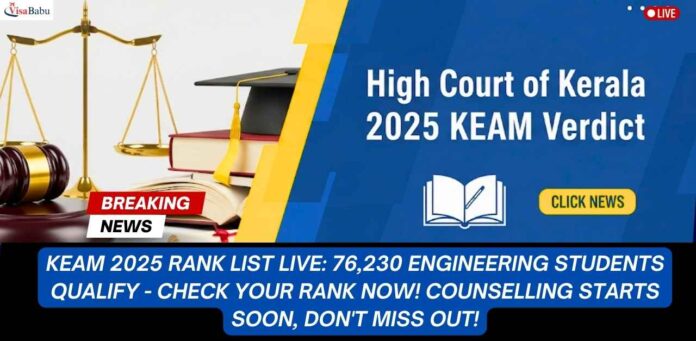The High Court of Kerala has once again taken centre stage in India’s education debate, this time by quashing the KEAM 2025 engineering entrance exam results over a controversial marks normalisation process. Intervention by the court has not only shaken up the admission process of thousands of students, but has also brought to light grievous loopholes in the method of marks normalisation across various boards of the education system in Kerala. The case has created a high level of debate regarding the principle of fairness and transparency behind the entrance exam assessment strategies, and it has brought a lot of interest to the students, the parents and the educators within the state.
What is KEAM, and Why Does Marks Normalisation Matter?
The Kerala Engineering, Architecture, and Medical (KEAM) entrance examination is an important mode of entry for students who aim to do professional courses in the best colleges in Kerala. Every year, more than 85 thousand applicants with different educational backgrounds- Kerala State Board, CBSE and ICSE all applied to obtain prestigious places. Also, to normalise the field, KEAM uses a combination of marks in entrance exams and marks in Plus Two (Class 12) by forcing all the scores through a normalisation procedure to remove variability in board examination evaluation standards.
Why Normalisation?
- Variated Boards: Students in Kerala State, CBSE, and ICSE boards have varying syllabi, marking and difficulty.
- Perceived Unfairness: It is injustice with the absence of normalisation; students under boards that have stricter examination guidelines can be put at a disadvantage.
- Purpose: The aim is to arrive at an objective, comparable score of such candidates, irrespective of their board.
How Normalisation Works?
As it has always been done, KEAM followed a statistical approach grounded on the worldwide average as well as the standard deviation of marks given in the boards. But this procedure has been widely criticised as being too complex and has also been accused of favouring some students due to their board of studies, among others.
Timeline of the 2025 KEAM Controversy
| Date | Event |
| Feb 19, 2025 | Original KEAM prospectus released with 1:1:1 subject weightage |
| Apr 23-29, 2025 | KEAM 2025 entrance exams were conducted |
| May 14, 2025 | KEAM 2025 scores published |
| July 1, 2025 | State government amends prospectus, changes subject weightage to 5:3:2 |
| July 1, 2025 | Rank list published using the new formula |
| July 9, 2025 | High Court of Kerala annuls KEAM results, orders fresh rank list |
| July 10, 2025 | Government files appeal; Division Bench to hear the case |
The Core Issue: Skewed Marks Normalisation
What Changed in 2025?
- Old System: Mathematics, Physics and Chemistry with equal weightage (Mathematics: Physics: Chemistry = 1:1:1).
- New System: No weightage- 5:3:2 (Mathematics: 150, Physics: 90, Chemistry: 60 marks out of 300).
- Rationale: Kerala syllabus students claimed they were losing up to 30 marks due to the old normalisation process, which used the global mean and standard deviation.
- Controversy: The new formula, introduced just an hour before the rank list was published, was seen as favouring Kerala board students and disadvantaging CBSE/ICSE students.
The Prospectus Change
The original KEAM 2025 prospectus, released in February, clearly outlined the evaluation method and weightage. However, after the entrance exams and initial score publication, the Kerala government amended the prospectus on July 1, 2025, altering the subject weightage formula. Students and parents were not prepared for this sudden switch, and therefore created a lack of understanding and feelings of outrage.
Legal Battle on KEAM Verdict: High Court of Kerala Steps In 2025
Key Highlights from the Verdict
- The High Court of Kerala ruled that the last-minute change to the marks normalisation formula was “illegal, arbitrary, and unjustified.”
- The court observed that the change appeared to be a reaction to the perceived underperformance of Kerala syllabus students.
- The Commissioner for Entrance Examinations was directed to revert to the original prospectus and recalculate the rank list.
- The appeal of the government is awaiting a hearing before a Division Bench.
KEAM Verdict Judicial Observations
The single-judge bench took note that any adjustment in the criteria of evaluation should be made sufficiently early and communicated clearly to all stakeholders. The court had stressed predictability and fairness in entrance tests, especially where it is to decide the future of thousands of students.
Impact on Students: Who Lost and Who Gained?
| Board | Impact of Old Formula (Global Mean/SD) | Impact of New Formula (5:3:2) | Student Sentiment |
| Kerala State | Lost up to 30-35 marks | Gained parity, higher ranks | Relief, but controversy |
| CBSE/ICSE | Gained 8-15 marks | Lost previous advantage | Anger, legal challenge |
Real Stories
- Ranking in the Kerala State Board, Anjali R. had moved upward by more than 300 positions under the new formula, only to be plunged once again into uncertainty following the court’s ruling.
- Rahul P., a CBSE student, lost his spot in his preferred engineering college due to the sudden change in normalisation, prompting his family to join the legal challenge.
Student Sentiment on KEAM Verdict
- A great number of CBSE/ICSE students suffered a drastic fall in their rankings.
- Having campaigned for months against the old system, Kerala board students were rewarded by the new formula—that is, until the court’s intervention.
- Both cohorts are once again in limbo, as admission processes are suspended until the court finalises its verdict.
The Standardisation Debate: Statistical Methods vs Proportional Methods
Overview of Normalisation Methods
| Method | Description | Criticism/Support |
| Global Mean/SD | Uses statistical parameters to standardise marks across boards | Seen as scientific but complex, led to Kerala board students losing marks |
| Proportional Scaling | Compares individual scores to board toppers; e.g., (Student Score × Topper Score / Board Topper) | Simpler, but can favour one board over another |
Expert Opinions
- Statistical Method: Although many educationists appreciate its scientific rigour, detractors find it obscure and hard for students to grasp.
- Proportional scaling: while generally easier to understand, it may inadvertently embed its own biases-particularly when candidates who secure the highest marks record marks that are far from the mean.
Student Voices and Protests
Since the publication of the controversial rank list, Kerala has witnessed:
- Protests and Sit-ins: Student bodies and parents have organised demonstrations at both the Secretariat and the Office of the Commissioner for Entrance Examinations.
- Social-Media Campaigns: Hashtags like #KEAMJustice and #FairNormalisation have trended on X (formerly Twitter), amplifying student grievances.
- Petitions: Multiple petitions were filed in the High Court of Kerala, with students from both Kerala and CBSE boards demanding a return to the original prospectus.
Key Demands from Students
- Normalisation procedures that are both transparent and predictable.
- There should be no retrospective amendments to the evaluation criteria.
- Prompt initialised for any alterations to the admission process.
Government’s Stand and Next Steps
- The Kerala government insists that it seeks fairness for every student as its sole aim.
- Higher Education Minister R Bindu has asserted that every decision was arrived at openly and in concert with expert committees.
- Hearings on the government’s appeal against the High Court order are set to commence, and the decision reached is likely to precede how future entrance examinations are administered.
- The Commissioner for Entrance Examinations has reassured students that any admissions will remain suspended until the legal proceedings are finalised.
Official Statements
- “We acted on the recommendations of experts to address the longstanding grievances of Kerala syllabus students,” said Minister Bindu.
- “We respect the High Court of Kerala’s verdict and will abide by the law, but we believe the new formula was fairer,” said an official from the Education Department.
National Implications: Is It Time for a Uniform Policy?
The KEAM controversy has once again spurred calls for a standardised policy for entrance examinations on the national scale. As nearly identical controversies surface in Tamil Nadu, Maharashtra, and West Bengal, experts maintain that the uneven handling of alleviating these disputes is generating confusion and uncertainty across India’s student body.
Recommendations from Experts
- Early Announcement: All changes to evaluation formulas should be announced before the academic year begins.
- Transparency: The normalisation mechanism ought to be made openly accessible and intelligible.
- Independent Oversight: An independent body should oversee the standardisation process to prevent political or board-level bias.
- National Policy: The Ministry of Education ought to adopt a uniform framework that covers all state- and nation-level entrance examinations.
Key Dates and Figures
| Event | Date/Number |
| KEAM 2025 Exam Dates | April 23-29, 2025 |
| KEAM 2025 Score Publication | May 14, 2025 |
| Rank List (New Formula) | July 1, 2025 |
| High Court Verdict | July 9, 2025 |
| Students Affected | Over 86,000 |
What’s at Stake for Kerala’s Engineering Aspirants?
Admission Process on Hold
- All engineering admissions in Kerala are currently suspended.
- The situation leaves students in a state of indecision, with the counselling sessions having been shelved indefinitely.
- Even the private colleges have suspended their admissions processes until the courts give their decision.
Psychological Impact
- This indecisiveness has affected students psychologically, as most of them have expressed feelings of anxiety and stress.
- There is no career planning, and some students are even thinking of getting out of Kerala to continue with their careers.
Conclusion
The High Court of Kerala has put the spotlight on the urgent need for transparent and fair mark normalisation processes in entrance exams. The 2025 KEAM row serves as an eye-opener to any policymakers, education boards and students. With thousands of applicants at stake, the future of legal battle remains uncertain, and there is a need for explicit, unified, and impartial analysis approaches in the competitive educational culture of India. The system must be reversed because this is the only scientifically sound and predictable process that can build up the confidence of the system, and no student must be disadvantaged excessively.
Frequently Asked Questions (FAQ)
Q1: What is the primary reason for the High Court of Kerala cancelling the KEAM 2025 results?
A: The court found the last-minute change to the marks normalisation formula “illegal, arbitrary, and unjustified,” as it was introduced after the exam process had begun and without adequate notice to students.
Q2: What was the impact of the new normalisation formula to students?
A: The new 5:3:2 subject weightage formula was seen as favouring Kerala syllabus students and disadvantaging CBSE/ICSE students, leading to a significant reshuffling of ranks.
Q3: What happens next for KEAM 2025 aspirants?
A: An appeal has been raised by the government. The High Court, by its Division Bench, will decide whether the initial or modified formula shall be applied in making final rankings.
Q4: What are the main criticisms of the mark’s normalisation process?
A: Critics say changes made at the last moment and on a frequent basis add uncertainty and create a lack of equity. The more systematic and visible standardisation is demanded as well.
Q5: Where can I find the latest updates on the KEAM 2025 case?
A: Keep up with official announcements by the Kerala government and the High Court, as well as good news audio or video channels dealing with education and legal news.




